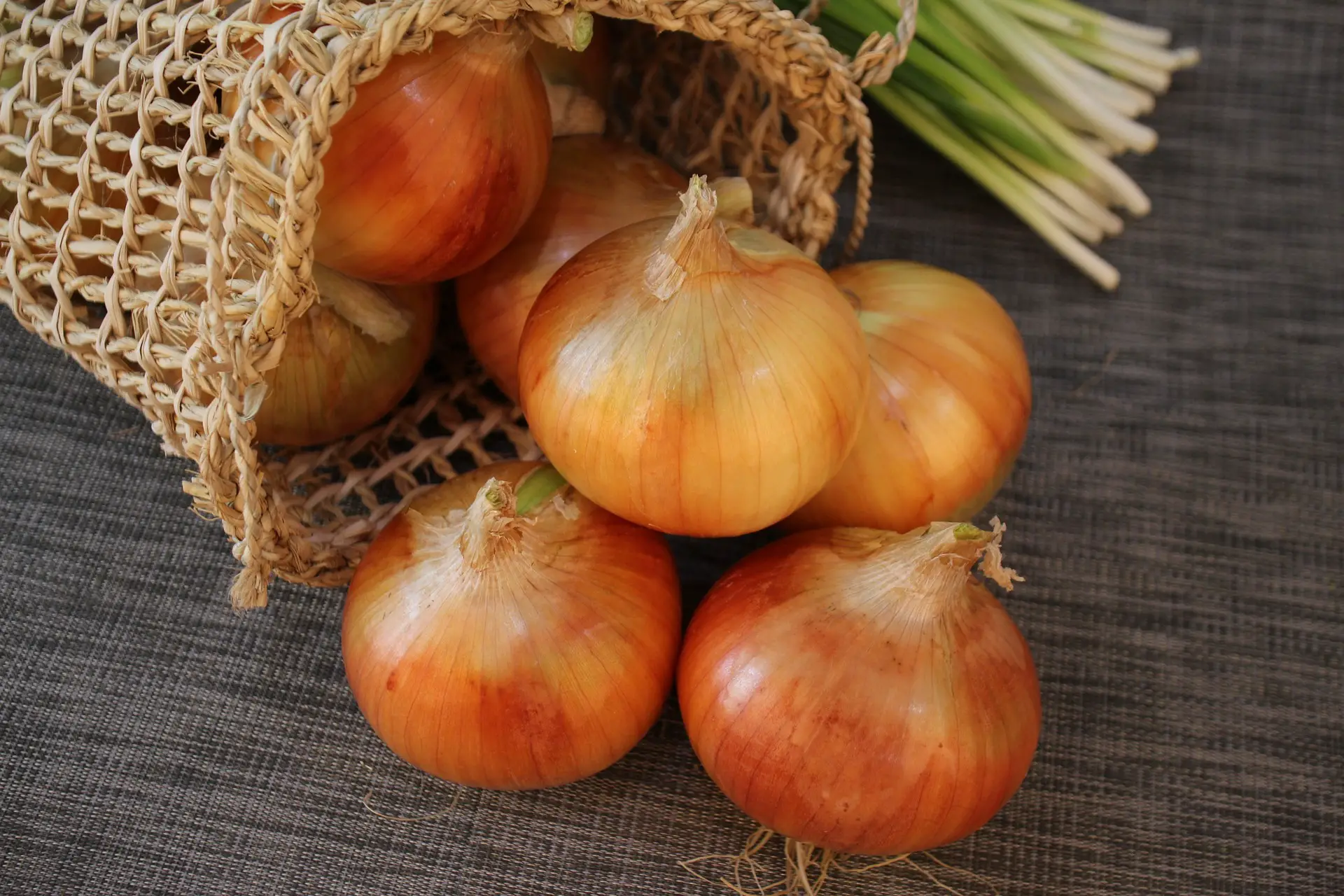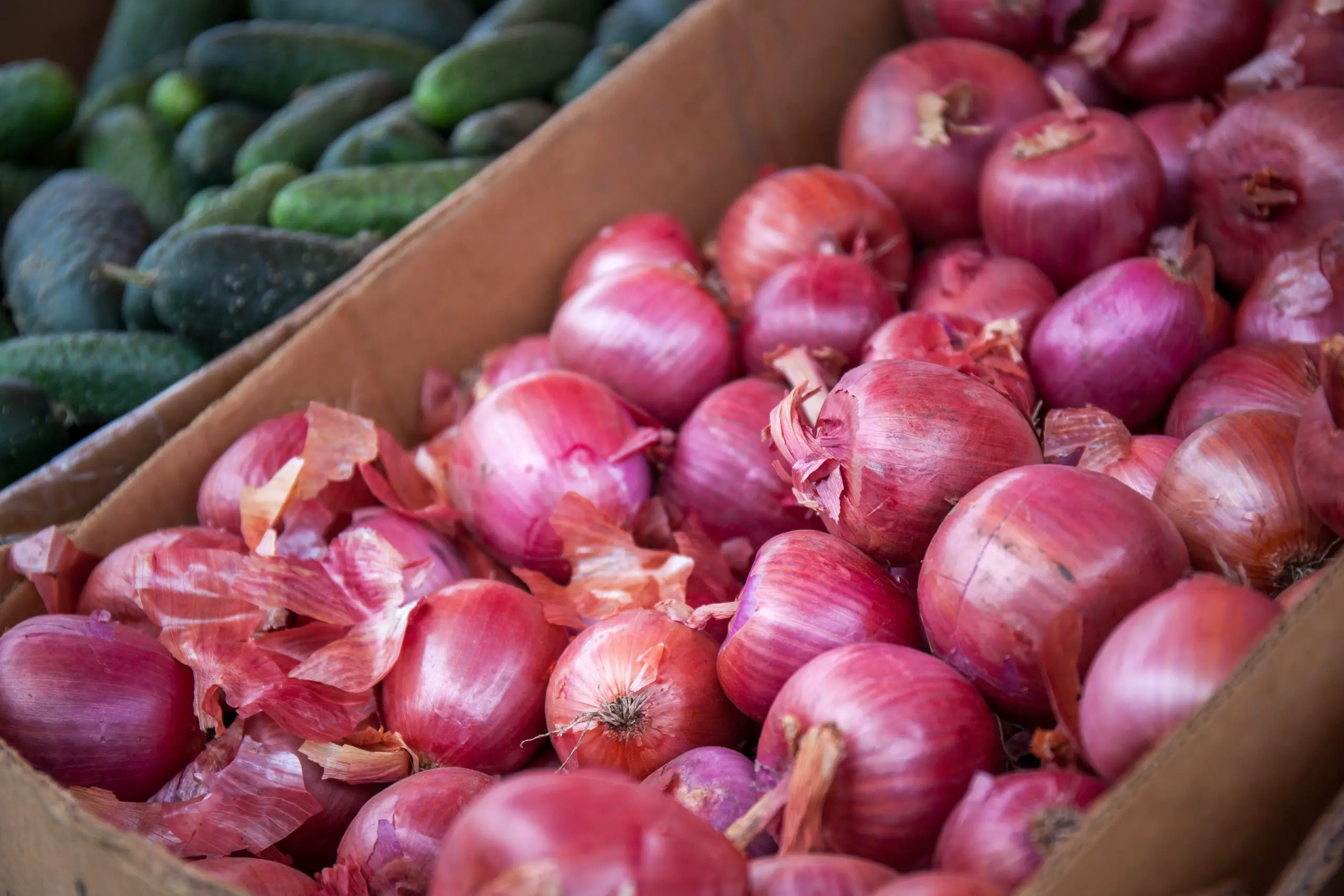Onions are a great alternative in many kitchens and can add flavor and depth to various dishes. However, proper storage is crucial to ensuring that your onions stay fresh and tasty for as long as possible. Fresh onions from the market or grocery store can be maintained for several months if stored properly.
Whether you prefer to keep your onions in the pantry, fridge, or freezer, there are a few key things to consider to stay fresh and flavorful. This article will discuss the best ways to store onions to extend their shelf life and keep them in top condition. So, read on to learn more about where to store onions and keep them at their best.

Where to Store Onions?
If you recently bought a large bag of onions from the grocery store to use over a few months, you should set up your stored onions to endure. Here are some ideas for where to store onions to keep them fresh for longer.
Step 1: Select the Right Type of Onion for your wants:
Different types of onions have different shelf lives. For example, sweet onions have a shorter shelf life than yellow onions. By considering the flavor, texture, and shelf life of different onions, you can choose the right one for your needs and ensure that you have a fresh and flavorful ingredient for all your cooking needs.
- Consider the flavor and intensity of the onion. Yellow onions have a moderate flavor and are versatile enough to be used in various dishes. For salads and sandwiches, sweet onions with a milder flavor, like Vidalia or Willamette Watermark, are excellent.
- Red onions have a slightly sweeter and spicy flavor, making them good for adding color and flavor to salads and sandwiches. White onions have a sharp and spicy flavor and are often used in Mexican and Southwestern dishes.
- Think about the texture of the onion. Some onions, like sweet ones, have a softer texture and are better for cooking methods requiring a longer cooking time. Others, like yellow onions, have a firmer texture and are good for cooking methods that require a shorter cooking time.
- Consider the shelf life of the onion. Some onions, like sweet onions, have a shorter shelf life and are best used within a few weeks of purchase. Others, like yellow onions, have a longer shelf life and can be stored for several months.
Step 2: Place Onions in a Cool, Dry, and Well-Ventilated Place:
Onions should be held in a cool, dry, and well-ventilated place to stay fresh for as long as possible. Some good options for storing onions include pantries, basements, and garages.
These areas typically have a cool temperature and good air circulation, which helps prevent the onions from spoiling. It’s important to avoid storing onions in the fridge, as the high humidity can cause them to spoil more quickly.
Additionally, onions should not be exposed to heat or direct sunshine since these factors can hasten their sprouting or deterioration. To maximize air circulation and prevent the onions from getting damp, store them in a mesh bag or a perforated container. This will help keep the onions fresh and flavorful for as long as possible.
Step 3: Keep Onions Away from Direct Sunlight and Heat Sources:
A common spice in many meals, onions can be challenging to preserve properly. Onions can quickly go well if stored correctly, leaving you with a slimy, inedible mess. One important aspect of proper onion storage is keeping them away from heat and sunlight. Heat can cause onions to sprout or go bad more quickly.
Sunlight can also cause onions to spoil faster, as it can cause the outer layers of the onion to dry out and become papery. To ensure that your onions stay fresh and flavorful for as long as possible, it’s important to put them in a cool, dry, and well-ventilated place that is out of direct sunlight.
Some good options for storing onions include pantries, basements, and garages. These areas typically have a cool temperature and good air circulation, which helps prevent the onions from spoiling. Keeping your onions away from heat and sunlight ensures they stay fresh and flavorful for longer.
Step 4: Don’t Store Onions with Potatoes:
One reason is that potatoes give off moisture and gases that can cause onions to spoil faster. Onions are best stored in a dry, well-ventilated place to prevent them from getting damp and rotting.
When stored with potatoes, the excess moisture and gases from the potatoes can cause the onions to become moist and spoil more quickly. In addition, storing onions and potatoes together can lead to the absorption of flavors from one vegetable to the other.
To ensure that your onions and potatoes stay fresh and flavorful, storing them in separate areas with good air circulation is best. This will help prevent the onions from getting damp and will also prevent the absorption of flavors between the two vegetables. This can result in potatoes that taste like onions or onions that taste like potatoes.
Step 5: Don’t Wash Onions Before Storing them:
One important aspect of proper onion storage is not washing them before storing them. Washing onions before storing them can cause them to spoil more quickly. Onions are best stored in a dry, well-ventilated place to prevent them from getting damp and rotting.
When washed, onions can absorb moisture from the water, which can cause them to become moist and spoil more quickly.
In addition, washing onions before storing them can remove the protective outer layers of the onion, making them more prone to spoilage. It’s best to wash onions just before using them to ensure they are as fresh and flavorful as possible.
Step 6: Use Older Onions First
Although common in many meals, onions can be difficult to preserve correctly. Onions can quickly go well if stored correctly, leaving you with a slimy, inedible mess. Onions that have been stored for a longer period will have a shorter shelf life, so it’s important to use them up first.
To get the most out of your onions, follow these tips; it’s important to use older ones first. Onions that have been stored for a longer period will have a shorter shelf life and are more prone to spoilage. To prevent waste, it’s important to use older onions before they go bad. This will ensure you enjoy fresh, flavorful onions in your dishes.
To correctly store onions and increase their shelf life, it’s critical to select the suitable variety for your needs and store them in a cold, wet, well-ventilated location with excellent air to circulate and keep them out of direct sunlight and heat. These simple guidelines will ensure that your onions stay as fresh and flavorful as possible.
Should Onions be Kept in a Refrigerator?
One question often arises about whether onions should be stored in the refrigerator. The short answer is no; onions should not be stored in the refrigerator. The high humidity in the refrigerator can cause onions to spoil more quickly, as it can cause them to become moist and rot.
If you need to store onions in the refrigerator, it’s important to wrap them tightly in plastic or aluminum foil to protect them from the humidity. However, there are better storage methods than this, and onions will generally stay fresher for longer if stored in a cool, dry place outside the refrigerator.
To keep your onions fresh and flavorful for as long as possible, place them in a child, dry, and well-ventilated place away from direct sunlight and heat sources. This will keep the onions fresh and flavorful for your cooking needs by preventing them from becoming damp.
How Long do Onions Last?
The shelf life of onions is determined by where they are stored. According to Cooper, peeled onions will last 10 to 14 days in the refrigerator, and chopped onions will last seven to ten days. While there are better places to store whole onions than the refrigerator, Cooper claims they will last for two months.
“If stored in a cool, ventilated, and dry area of your home, whole onions can have a shelf life of three months or even up to six months, provided they are dry, firm, with skins intact, and not sprouting,” she says. Frozen onions should be consumed within eight months if kept in the freezer at or below zero degrees.
How can you Tell if your Onions are Bad?
Onions are a broad ingredient in many dishes, but they can only go well quickly if kept securely. Here are a few signs that your onions may have gone bad:
- The onion has a slimy or mushy texture: It is likely spoiled if it feels soft or slimy to the touch.
- The onion has a strong, unpleasant smell: If the onion has a strong, pungent smell that is unpleasant, it is likely spoiled.
- The onion has visible mold: It is likely spoiled if you see any signs of mold on it.
- The onion has sprouted: If it has started to sprout, it is past its prime and may not be as fresh or flavorful as it once was.
If you notice any of these indications, it’s best to discard the onion and replace it with a fresh one. By properly storing your onions and using them before they have a chance to go bad, you can ensure that you always have a fresh and flavorful ingredient for all your cooking needs.
What Negative Effects can Spoiled Onions have on your Body?
Consuming spoiled onions can lead to symptoms such as nausea, vomiting, diarrhea, stomach cramps, difficulty breathing, hives, and swelling. Although onions are a key denominator in many recipes, eating rotten can be hazardous.
It is important to always check the quality of onions before consuming them and to store them to prevent spoilage properly. If an onion looks or smells spoiled, it must be thrown away and replaced with a new one. In severe cases, anaphylaxis may occur.
- Food poisoning: If an onion has gone bad, it can contain harmful bacteria that can cause food poisoning. Signs of food poisoning include nausea, vomiting, diarrhea, and stomach cramps. Here are a few dangers to be aware of if you eat spoiled onions:
- Allergic Response: Some people may have an allergic reaction to spoiled onions. Hives, swelling, and anaphylaxis are some signs of an allergic response.
- Stomach upset: Spoiled onions can cause stomach upset, including nausea, vomiting, and diarrhea.
It’s important to always check the quality of your onions before using them in a dish. By properly storing your onions and using them before they have a chance to go bad, you can avoid these dangers and enjoy a safe and flavorful meal.
Conclusion
In conclusion, storing onions correctly is important to ensure they stay fresh and flavorful for as long as possible. Onions should be in a cool, dry area with sufficient airflow and ventilation. They should not be stored in the fridge, as the high humidity can cause them to spoil faster.
Spoiled onions may negatively affect your body, which may cause food poisoning, allergic responses, or stomach trouble. To prevent any potentially harmful effects on the Body, an onion that appears or smells bad should be thrown away and replaced with a fresh one.
To avoid wasting food, it’s vital to use older onions first and to avoid washing onions before storing them. Adhering to this straightforward advice guarantees that your onions stay delicious and fresh for all your cooking needs.
